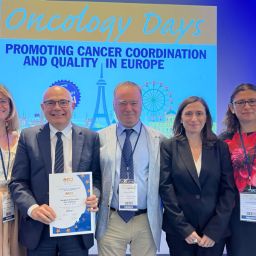
Recently published in Nature Reviews Gastroenterology & Hepatology*, a comprehensive Review focused on gastric cancer and gastro-oesophageal junction cancer (GC-GOJC) updates on the epidemiology and risk factors of these tumors, explores current insights into the molecular bases and subtyping of disease, highlights treatment strategies in the pipeline, and points to therapeutic approaches ahead.
“As the fifth most commonly diagnosed cancer and fourth leading cause of cancer death worldwide, gastric cancer represents a major health-care problem. In our review we discuss current challenges that are hindering efforts aimed at more effectively combating this complex disease. We also suggest alternative strategies that could ultimately help to improve patient survival rates,” said Josep Tabernero, Head of the Medical Oncology Department at the Vall d’Hebron University Hospital ,VHIO’s Director, and corresponding author of this invited article.
The authors, including VHIO’s Maria Alsina and Marc Diez, Clinical Investigators of our Gastrointestinal and Endocrine Tumors Group led by Teresa Macarulla, discuss the limitations and lessons learned from several previously reported studies with targeted agents that failed to improve clinical outcomes. They review ongoing phase II and III clinical trials with new targeted agents including novel antibody-drug conjugates (ADCs), and immunotherapy with immune checkpoint inhibitors (ICIs) in advanced and localized settings as well as highlight other studies that support the use of both tissue and circulating tumor DNA to improve the diagnosis and therapeutic follow-up of gastric cancer.
Providing examples of national strategies with massive molecular screening of patients, the authors illustrate how these efforts are now stepping up in detecting those candidates who would most likely benefit from targeted treatments. They also discuss the need for optimal clinical trial designs that include appropriate biomarker selection and consider the spatial and temporal heterogeneity features of GC-GOJC based on individual clinical and molecular data.
“While gastric cancer should certainly be considered as a particular disease given the inherent fragility of the patients and its aggressive nature, a molecular approximation should be made early from the onset of disease and throughout its evolution. Only then will we ultimately succeed in improving overall survival and the quality of life of patients,” observed Maria Alsina, first author of this present article.
“Achieving an in-depth understanding of the intrinsic characteristics of each patient’s disease is absolutely key as we collectively seek to deliver on the promise of precision medicine for an increasing number of tumor types including gastric cancer,” concluded Josep Tabernero.
###
Reference:
*Alsina M, Arrazubi V, Diez M, Tabernero J. Current developments in gastric cancer: from molecular profiling to treatment strategy. Nat Rev Gastroenterol Hepatol. 2022 Nov 7. doi: 10.1038/s41575-022-00703-w. Epub ahead of print. PMID: 36344677.

























